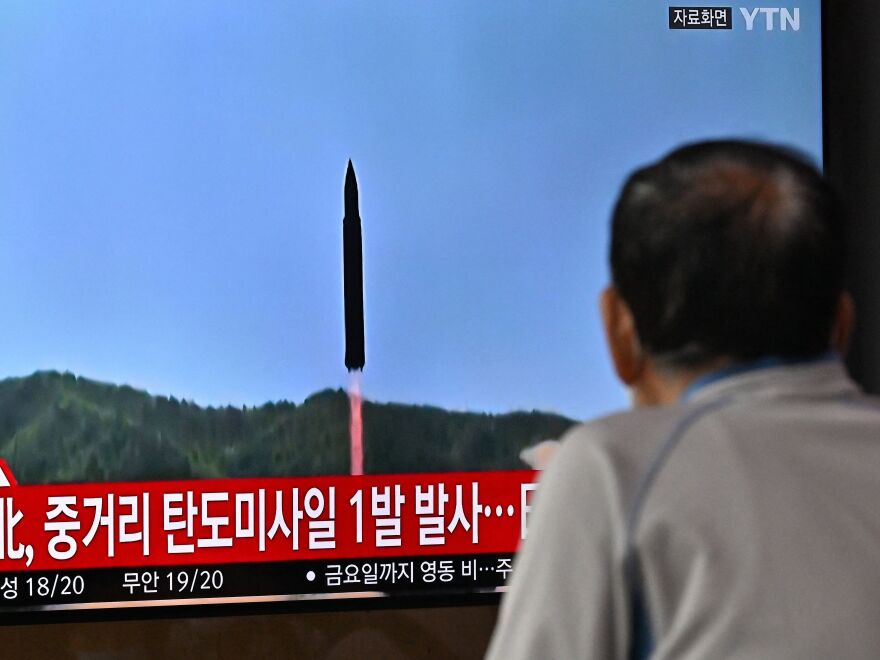Updated October 3, 2022 at 9:05 PM ET
SEOUL, South Korea — North Korea launched an intermediate-range ballistic missile on Tuesday that flew over Japan for the first time in five years, the South Korean government said, triggering alerts across Japan.
Tuesday's North Korean launch put U.S. military bases in Guam within reach. The U.S. government condemned the launch and National Security Adviser Jake Sullivan called his Japanese and South Korean counterparts to coordinate a response, the White House said.
The launch of the ballistic missile (IRBM ) took place from North Korea's northern Jagang province at around 7:23 a.m. local time, according to South Korea's Joint Chiefs of Staff. Television alerts warned residents in Tokyo and across northern Japan's Hokkaido and Aomori prefectures to take cover.
The South's joint chiefs said the missile flew approximately 2,796 miles to the east, reaching an altitude of 603 miles and a top speed of Mach 17, before landing in the Pacific Ocean. A body traveling at Mach 1 is traveling at the speed of sound. Mach 2 is twice the speed of sound.
Japan's Prime Minister Fumio Kishida called Tuesday's launch "outrageous," and said Japan strongly protested the action. South Korea's President Yoon Suk Yeol promised a resolute response. Both leaders said they would convene the National Security Council to discuss the situation.
Tuesday's launch was North Korea's fifth missile launch in just over a week, and the first time a North Korean missile has flown over Japan since 2017. After North Korea last tested an IRBM this past January, state media said authorities had fired it at a high angle, "in consideration of the security of neighboring countries," in other words, to avoid sending the missile over Japan.
Tuesday's missile launch by North Korea was the latest in a series of recent events that have ratcheted up the tension between Pyongyang and the U.S. and its East Asian allies. Last week, South Korea, the U.S. and Japan held their first trilateral anti-submarine drills in five years off the Korean Peninsula's east coast. It followed South Korean and U.S. warships conducting bilateral exercises in the area for four days. Both military drills this week involved the nuclear-powered aircraft carrier USS Ronald Reagan.
Those tensions led to unprecedented summits between then-President Trump and North Korean leader Kim Jong Un in 2018 and 2019 over the North's nuclear ambitions. Negotiations between the U.S. and North Korea have since stalled and Pyongyang now says it will not bargain away its nuclear weapons.
In South Korea, a new conservative government that took office in May has emphasized deterrence over diplomatic engagement, raising concerns over potential cycles of escalation and counter-escalation, including more missile tests from North Korea.
Observers say Kim may use his country's missile and nuclear tests to pressure the U.S. and other countries into lifting international sanctions placed on North Korea.
Copyright 2023 NPR. To see more, visit https://www.npr.org.









